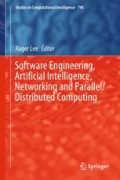Abstract
In the Internet era, the effect of reviews and comments is reinforced as one can make a well-informed decision based on the experiences of others. Crowdfunding site, Kick-starter presents a platform to the backers to leave their feedback on a campaign. However, the comments are in abundance and diverse in nature that it becomes barely possible to wade through them to pick up the desired information. This study takes a step to identify the hidden themes in these comments to discover the different topics of discussion in scam campaigns and then these topics are compared with the topics identified in genuine campaigns. Topic models such as LDA (Latent Dirichlet Allocation) have been used in many areas. We have also used LDA to extract the dominant topics in a document. We evaluated this model on both scam and non-scam campaigns comments. We observed that the resulted topics in each category are distant from each other.
Access this chapter
Tax calculation will be finalised at checkout
Purchases are for personal use only
References
Blei, D.M., Ng, A.Y., Jordan, M.I.: Latent Dirichlet allocation. J. Mach. Learn. Res. 3, 993–1022 (2003)
Cordova, A., Dolci, J., Gianfrate, G.: The determinants of crowdfunding success: evidence from technology projects. Procedia-Soc. Behav. Sci. 181, 115–124 (2015)
Mollick, E.: The dynamics of crowdfunding: an exploratory study. J. Bus. Ventur. 29(1), 1–16 (2014)
Marom, D., Sade, O.: Are the life and death of an early stage venture indeed in the power of the tongue? Lessons from online crowdfunding pitches (2013)
Titov, I., McDonald, R.: Modeling online reviews with multi-grain topic models. In: Proceedings of the 17th International Conference on World Wide Web, pp. 111–120. ACM, April 2008
Ramage, D., et al.: Labeled LDA: a supervised topic model for credit attribution in multi-labeled corpora. In: Proceedings of the 2009 Conference on Empirical Methods in Natural Language Processing: Volume 1-Volume 1. Association for Computational Linguistics (2009)
Ramage, D., Manning, C.D., Dumais, S.: Partially labeled topic models for interpretable text mining. In: Proceedings of the 17th ACM SIGKDD International Conference on Knowledge Discovery and Data Mining. ACM (2011)
Andrzejewski, D., Zhu, X.: Latent Dirichlet allocation with topic-in-set knowledge. In: Proceedings of the NAACL HLT 2009 Workshop on Semi-Supervised Learning for Natural Language Processing. Association for Computational Linguistics (2009)
Xu, A., et al.: Show me the money!: an analysis of project updates during crowdfunding campaigns. In: Proceedings of the SIGCHI Conference on Human Factors in Computing Systems. ACM (2014)
AlSumait, L., Barbará, D., Domeniconi, C.: On-line LDA: adaptive topic models for mining text streams with applications to topic detection and tracking. In: Eighth IEEE International Conference on Data Mining, 2008, ICDM 2008. IEEE (2008)
Hu, Y., et al.: ET-LDA: joint topic modeling for aligning events and their twitter feedback. In: AAAI, vol. 12 (2012)
Baldi, P., Frasconi, P., Smyth, P.: Index. Wiley, New York (2003)
Sebastiani, F.: Machine learning in automated text categorization. ACM Comput. Surv. (CSUR) 34(1), 1–47 (2002)
Zhao, W.X., et al.: Jointly modeling aspects and opinions with a MaxEnt-LDA hybrid. In: Proceedings of the 2010 Conference on Empirical Methods in Natural Language Processing. Association for Computational Linguistics (2010)
Mukherjee, A., Liu, B.:. Mining contentions from discussions and debates. In: Proceedings of the 18th ACM SIGKDD International Conference on Knowledge Discovery and Data Mining. ACM (2012)
Somasundaran, S., Wiebe, J.: Recognizing stances in ideological on-line debates. In: Proceedings of the NAACL HLT 2010 Workshop on Computational Approaches to Analysis and Generation of Emotion in Text. Association for Computational Linguistics (2010)
Hasan, K.S., Ng, V.: Stance classification of ideological debates: data, models, features, and constraints. In: Proceedings of the Sixth International Joint Conference on Natural Language Processing (2013)
Mukherjee, A., Liu, B., Glance, N.: Spotting fake reviewer groups in consumer reviews. In: Proceedings of the 21st International Conference on World Wide Web. ACM (2012)
Gretarsson, B., et al.: TopicNets: visual analysis of large text corpora with topic modeling. ACM Trans. Intell. Syst. Technol. (TIST) 3(2), 23 (2012)
Ghosh, D., Guha, R.: What are we ‘tweeting’ about obesity? Mapping tweets with topic modeling and Geographic Information System. Cartogr. Geogr. Inf. Sci. 40(2), 90–102 (2013)
Acknowledgement
This work (Grants No. C0515862) was supported by Business for Cooperative R&D between Industry, Academy, and Research Institute funded Korea Small and Medium Business Administration in 2017.
Author information
Authors and Affiliations
Corresponding author
Editor information
Editors and Affiliations
Rights and permissions
Copyright information
© 2019 Springer Nature Switzerland AG
About this chapter
Cite this chapter
Shafqat, W., Byun, Y. (2019). Identifying Topics: Analysis of Crowdfunding Comments in Scam Campaigns. In: Lee, R. (eds) Software Engineering, Artificial Intelligence, Networking and Parallel/Distributed Computing. SNPD 2018. Studies in Computational Intelligence, vol 790. Springer, Cham. https://doi.org/10.1007/978-3-319-98367-7_11
Download citation
DOI: https://doi.org/10.1007/978-3-319-98367-7_11
Published:
Publisher Name: Springer, Cham
Print ISBN: 978-3-319-98366-0
Online ISBN: 978-3-319-98367-7
eBook Packages: Intelligent Technologies and RoboticsIntelligent Technologies and Robotics (R0)

